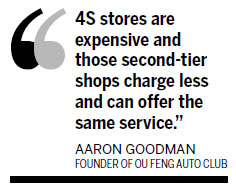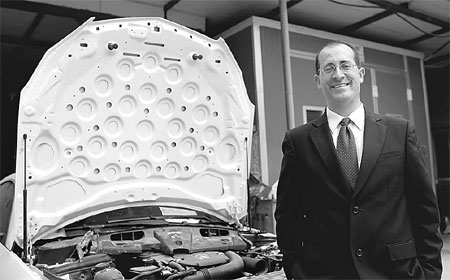Wheels of fortune
Updated: 2013-05-26 08:08
By Ji Xiang(China Daily)
|
|||||||||
|
Aaron Goodman regards his business as a rival to China's 4S dealerships. Liu Zhe / China Daily |

Aaron Goodman's road to China began as a student with a head full of dreams that took him to Beijing where he launched a business aimed at the country's growing number of car owners. Ji Xiang reports.
Today, it's not unusual for an American to arrive in China with a head full of ideas about launching a successful business. For many people, pushed abroad by the economic crisis, China has become a land of opportunity.
Aaron Goodman is among the growing army of US businessmen operating across the country, but for him, the journey began 20 years ago as a sophomore at New York University.
It was 1994 when Goodman's China dream started to take shape. "I read about the explosive growth of the Chinese economy and I decided when I was 20 years old that I wanted to learn Chinese and do business in China. That has been the focus of my life ever since," he says.
He began by learning to speak Chinese, spending the two years at college taking Mandarin classes.
In 1997, he moved to Taiwan to work as an English teacher and continue to study Mandarin.
He says his experience in Taiwan taught him not only language skills, but also about Chinese culture, and when he arrived in the Chinese mainland in 1999, he suffered less of a culture shock than many people do.
Goodman worked at two international companies in Shanghai before returning to the US to study for a higher degree at the University of South Carolina. But the "Chinese track" that he enrolled in took him back to China again, this time to Beijing, in 2004, where he studied at Peking University.
On completing his studies, Goodman was employed as a marketing strategist by China Automobile Association.
In 2008, he registered his own company - Ou Feng (European style) Auto Club. "There are a lot of cars in Beijing, a lot of traffic, and driving to a car repair shop and waiting in line can take a long time," he says. "So I thought if people can have mechanics come to their house, and do their maintenance, this saves a lot of time."
And so Goodman's business was born - a car repair service that comes to your home.
The idea was not an immediate success. "The biggest problem was because I don't have a shop, people did not trust the whole thing," he says. "They thought, 'if there is a problem, where should I go?' It was very difficult getting customers."
But Goodman remained optimistic, and in time his commitment paid off.
"I did have customers," he says. "In a city with more than 5 million private cars, if I can get 1 percent of these people to trust me, that is a lot of people. If those people can trust me and can tell their friends, eventually the thinking will change."
Goodman adopted a very hands-on marketing approach. For the first three months of operation he offered a free oil change and personally handed out flyers advertising his service. He rented space in a department store parking lot and gave out more than 1,000 flyers a day. Most Chinese would not refuse to take the flyers because he was a foreigner.
He also held a lucky draw, which required people to leave their personal information. He could then call them up later to promote his car maintenance business.
In the first three months he saw a 24 percent return, he says. "In business, a return of 10 percent is phenomenal. This was a good thing I had going, even though I only had a few customers."
After three years of running the business as a door-to-door car maintenance service, Goodman changed direction and began franchising his business. He now partners with Chinese-owned car repair businesses that are required to abide by Ou Feng's customer service standards. In return, they are allowed to use the Ou Feng brand name.
Goodman regards his business as a rival to China's 4S dealerships, a term that refers to businesses authorized by foreign and domestic car manufacturers that offer sales, service, spare parts and customer feedback.
His customers are people with older vehicles that are no longer under the manufacturer's warranty.
"4S stores are expensive and those second-tier shops charge less and can offer the same service," he says.
Goodman believes Chinese patriotism also has a part to play in his success. When Chinese customers use the services of second tier repair shops, they are supporting Chinese owned companies, he says. And although Goodman himself is not Chinese, all other aspects of the business, including the franchise owners and employees are.
Goodman's dream of setting up his own business has become a reality, through hard work and patience. And it's a reality he hopes to expand on as China's car ownership expands along with his understanding of the country.
Contact the writer at jixiang@chinadaily.com.cn.
(China Daily 05/26/2013 page5)
